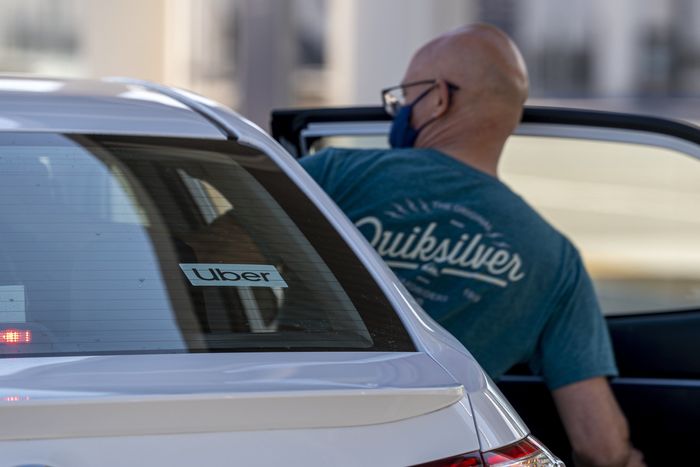Drivers for Uber UBER 2.47% Technologies Inc. and Lyft Inc. LYFT 3.45% who have confronted challenges as front-line workers during the health crisis are facing a new pandemic-related test: states lifting mask mandates.
The ride-sharing companies require that riders continue wearing masks. But drivers—who also are required to be masked—say the rules are becoming harder to enforce as state and local governments push for a widespread reopening, leading to friction between gig workers and passengers.
Late last month, the Centers for Disease Control and Prevention said more than 90% of Americans live in areas where they could drop face coverings indoors but advised wearing them in shared cabs. California, Massachusetts and New York recently joined the growing ranks of states to lift mask mandates indoors.
SHARE YOUR THOUGHTS
What can Uber, Lyft do to prevent friction between drivers and riders? Join the conversation below.
The tensions between drivers and riders, combined with rising gas prices, are discouraging many workers from returning to ride-share work, hampering efforts by Uber and Lyft to alleviate a yearlong labor shortage that has kept ride prices high.
“It’s just not worth it anymore,” said Anwaar Malik, a ride-share driver in New York City who added he has cut back on driving amid health concerns, rising crime and inflation. Mr. Malik said he ferried passengers earlier this month after a monthslong hiatus to find that many were hesitant to put on face coverings. “It’s getting worse,” he said.
Uber spokesman Andrew Hasbun said driver complaints about maskless passengers remained relatively consistent in February—when several states announced plans to lift mask mandates by March—compared with June 2020, the first full month of the mask mandate on Uber.
He said Uber’s policy is based on the CDC guidelines for shared cabs. “Riders and drivers who repeatedly violate our ‘No Mask. No Ride’ policy continue to risk losing access to Uber,” he said. Lyft spokeswoman Ashley Adams said “drivers have our full support to decline any ride that makes them feel unsafe.”
Many Uber and Lyft drivers migrated to delivering food and other jobs during the pandemic, spooked by health concerns from sharing cars with people and the inconsistency in earnings as new variants emerged. The companies spent millions of dollars giving bonuses to woo drivers, which helped them temper the labor shortage. Uber previously said it was pulling back on the incentives, but Chief Executive Dara Khosrowshahi said at a Morgan Stanley talk Monday that he expected them to continue.

Uber says its mask policy is based on CDC guidelines for shared cabs.
Photo: David Paul Morris/Bloomberg News
Mr. Khosrowshahi discussed the pain from rising fuel prices; drivers pay for gas themselves. He said that every 20% increase in gas costs could be offset by a 1% increase to rider fares. That calculus would keep driver earnings and Uber’s earnings flat, according to Mr. Khosrowshahi. He wasn’t asked about mask mandates.
Some drivers say they have been suspended after insisting that passengers wear masks. The companies don’t tell drivers why they were suspended, making it hard to verify the reasons.
Sulaimon Brown, an Uber driver from Charleston, S.C., said he declined to ferry a maskless passenger and reported the violation to Uber so he could be compensated for his time. He said a support representative said the company would alert the passenger about the violation. Mr. Brown said that later the same day his account was suspended. A summary of his driver account shows a 4.87-star rating out of 5 from more than 1,500 rides over the past six years.
“In writing it looks good. They say ‘No mask. No ride.’ But when you enforce it, then they fire you because the passenger accuses you of something you didn’t do,” Mr. Brown said. He said sharing cars can be risky in his state, where official data show just over 50% of residents are fully vaccinated; the CDC says 65.2% of people nationwide are fully vaccinated. Exchanges with passengers often got heated, he said.
“They say: ‘Why are you the only one asking us to wear a mask? We’re not wearing it at the supermarket or school,’ so they look at you like you’re the odd one out,” he said. Mr. Brown doesn’t drive for Uber anymore.
Uber’s Mr. Hasburn said Mr. Brown’s account was suspended after multiple rider complaints. He declined to elaborate.
Uber and Lyft say driver accounts are suspended based on the nature of complaints received. A sexual-assualt complaint triggers an instant termination while less severe complaints could add up over time, leading to temporary or permanent suspensions.
Drivers say the companies won’t explain why they were suspended—or review personal dashcam footage offered by them—unless faced with litigation. “It’s very frustrating,” said Jared Hoffa, the head of development at Chicago-based LegalRideShare LLC, a personal injury firm that represents gig workers. Mr. Hoffa said dozens of drivers have approached his firm over the past year, saying they were targets of false rider complaints that they think stemmed from disagreements over face masks.
Some maskless passengers retaliate by reporting that the driver wasn’t wearing a mask, knowing it would have repercussions for drivers, he said.
The companies say they are looking into ways to back up claims by drivers and riders. In December, Uber said it would pilot in-app audio recordings during a trip which could help it investigate complaints. The pilot is running in three U.S. cities in the Midwest and South.
Some drivers say they are taking maskless passengers despite what they think are safety risks because they need the money.
Miami-based Lyft driver David Solomon said his account was temporarily suspended several times during the pandemic, most recently last month. Mr. Solomon said those suspensions took place after he asked passengers to wear face coverings.
“I would say seven out of 10 passengers don’t wear a mask here, and most of them—80% or 90%—don’t even have a mask on their wrist or neck,” he said. “They don’t like being told what to do.”
Mr. Solomon stopped driving because of an injury late last year and was suspended again in February. “It was a harsh blow because you’re relying on this money to survive,” he said.
Mr. Solomon said he is back to driving and is accepting maskless passengers to avoid friction and the possibility of losing the work again. Lyft’s Ms. Adams declined to comment on his case.
Write to Preetika Rana at [email protected]
Copyright ©2022 Dow Jones & Company, Inc. All Rights Reserved. 87990cbe856818d5eddac44c7b1cdeb8








